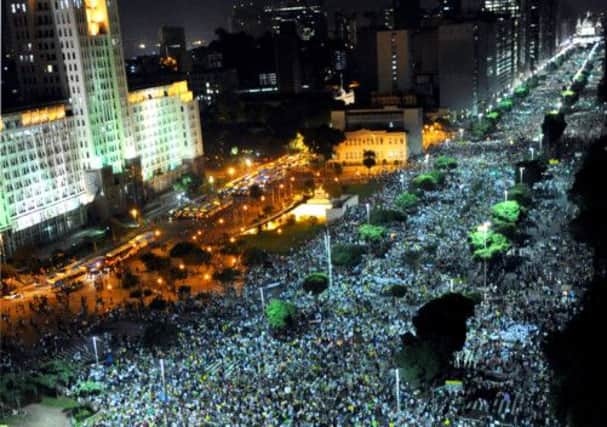Brazil: A million protesters take to streets


President Dilma Rousseff, who has been virtually mute in the face of the most violent protests in recent memory, called a meeting of government ministers. She has faced sharp criticism in Brazil’s media for what many called her lack of any leadership, and it was not clear what action her government might take.
There were growing calls on social media and in e-mails for a general strike next week.
Advertisement
Hide AdAdvertisement
Hide AdStanding in front of the battered government building he presides over, foreign minister Antonio Patriota said he was “very angry” that protesters had attacked a structure “that represents the search for understanding through dialogue”. He urged protesters “to convey their demands peacefully”.
Despite the violence, the majority of protests have been peaceful. In massive demonstrations this week, if small groups began to commit acts of vandalism, crowds would often turn and start to chant “No violence!”
But the pattern in cities across Brazil has been that, once night falls, the violence begins.
Protesters and police clashed in several cities into the early hours yesterday, as people vented their anger over a litany of complaints, from high taxes and corruption to rising prices. At least one protester was killed in Sao Paulo state when a car rammed into a crowd of demonstrators after the driver apparently became enraged about being unable to get along a street.
In Rio de Janeiro, where an estimated 300,000 poured into the seaside city’s central area, there were running clashes between riot police and groups of mostly young men with T-shirts wrapped around their faces. But peaceful protesters were caught up in the fray, too.
At least 40 people were injured in Rio, including Michele Menezes, a wisp of a woman whose youthful face and braces belie her 26 years. Bleeding and with her hair singed from the explosion of a tear gas canister, she said she and others had taken refuge from the violence in an open bar, only to have a police officer toss the canister inside.
The blast ripped through Ms Menezes’ jeans, tearing two coin-sized holes on the back of her thighs, and peppered her upper arm with a rash of small holes. “I was leaving a peaceful protest and it’s not the thugs that attack me but the police themselves,” she said.
She later took refuge in a hotel, along with two dozen youths, families and others who said they had been repeatedly hit with pepper spray by police as they also sheltered in a bar.
Advertisement
Hide AdAdvertisement
Hide AdProtesters said they would not back down. “They called us the ‘sofa generation’ before, but now we are waking up,” said medical student Aurelia Suarez, in reference to a criticism often levied by older generations at Brazil’s young people, brought up in the decades of growing affluence. “Now there’s no going back. The government has to understand we are serious and this won’t stop until there is change.”
University student Fernanda Szuster, 19, said: “I saw some pretty scary things, but they’re not going to shake me. There’s another march on the 22nd and I’m going to be there.”
In Brasilia, the capital, police struggled to keep hundreds of protesters from invading the foreign ministry and the crowd set a small fire outside. Other government buildings were attacked around the city’s central esplanade. There, too, police used tear gas and rubber bullets to try to scatter demonstrators.
Clashes were also reported in the Amazon jungle city of Belem, Porto Alegre in the south, Campinas north of Sao Paulo and Salvador in the north-east.
The unrest has hit Brazil as it hosts football’s Confederations Cup, with tens of thousands of foreign visitors in attendance. It comes one month before Pope Francis is due to visit the nation, and ahead of the 2014 World Cup and 2016 Olympics, raising concerns about how Brazilian officials will provide security.
The seemingly unstoppable tide of protests has, by its own admission, left Brazil’s leftist government perplexed. It rose to prominence on the back of pro-democracy protests, but the ruling Workers’ Party now finds itself on the receiving end of a revolt that was initially triggered by a 9 cent rise in bus fares but has grown into a massive, nationwide expression of outrage.
Protesters are enraged at the continuing focus on lifting Brazil’s international stature through events like the World Cup and the Olympics, while political corruption is endemic and public services, ranging from hospitals and schools to roads and police forces, are pitiful.